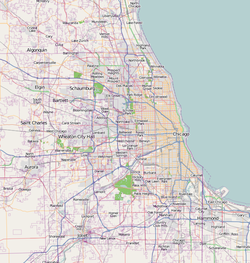Guyon Hotel
Guyon Hotel | |
 The Guyon Hotel in 2010 | |
| Location | 4000 W. Washington Blvd., Chicago, Illinois |
|---|---|
| Coordinates | 41°52′55″N 87°43′35″W / 41.88194°N 87.72639°W |
| Area | less than one acre |
| Built | 1928 |
| Architect | Jensen J. Jensen |
| Architectural style | Moorish Revival[2] |
| NRHP reference No. | 85000966[1] |
| Added to NRHP | May 9, 1985 |
The Guyon Hotel is a historic former hotel in Chicago, Illinois. The hotel was designed by Jensen J. Jensen - no relation to the famous landscape architect Jens Jensen - in 1927 and was built in red and cream brick with arched windows on two floors and exquisite, detailed terra cotta ornaments typical of Jensen's work.[3][4] It was built at a cost of $1,650,000 by J. Louis Guyon, a French-Canadian nightclub owner and dance instructor.[2]
The Guyon Hotel's first floor included commercial space and the hotel's lobby.[4] Two ballrooms were located on the second floor.[4] Guyon resided in the south penhouse.[4]
After the hotel opened in 1928, owner J. Louis Guyon mounted two AM radio towers to broadcast his radio station, WGES; the station aired morally conservative programming and music.[2] One of the second floor ballrooms was used as the station's studio.[4] Control of WGES was transferred to Harry and Thomas Guyon in the mid-1930s, and the station left the hotel in 1942, but it continues to broadcast as WGRB.[5][6][7][8] The hotel entered into receivership during the Great Depression, and in 1939 it was sold for $425,000.[2] In 1940, it was sold to Jack Galper and George London.[2] In 1948, the AM towers were replaced with an FM tower, and WOAK began broadcasts from the hotel.[9][10][4] WOAK became WFMT in 1951 and began airing classical music.[11] In 1954, the station's studios and transmitter were moved to the LaSalle–Wacker Building.[9][11] In 1964, the hotel was sold for $500,000.[2]
Soon after the hotel opened, police raided the four-room suite of Jack McGurn, also known as "Machine Gun Jack McGurn", a member of Al Capone's mob, and arrested him and another man after finding a machine gun and other weapons.[12]
In 1985, the Guyon Hotel was sold to the Lutheran non-profit organization Bethel New Life, who renovated the building and converted it to affordable housing.[2] Former President Jimmy Carter stayed in the renovated hotel for a week while working on a rehabilitation project with Habitat for Humanity; his room was reportedly "roach-infested" and "furnished with only a couch and a milk crate".[2] The housing effort ultimately failed when Bethel New Life ran out of funds. The building currently lies vacant and has changed possession over six times since 1995.[3] Due to building code violations, the hotel is in city demolition court; it is considered one of the ten most endangered landmarks in Illinois by the Landmarks Preservation Council of Illinois.[13]
The Guyon Hotel was added to the National Register of Historic Places on May 9, 1985.[1]
References
[edit]- ^ a b "National Register Information System". National Register of Historic Places. National Park Service. July 9, 2010.
- ^ a b c d e f g h Moser, Whet (April 27, 2012). "A Short History of Chicago's Beautiful, Decrepit Guyon Hotel". Chicago. Retrieved March 23, 2023.
- ^ a b Ori, Ryan. "Historic West Side hotel for sale at $500,000", Crain's Chicago Business. October 20, 2016. Retrieved October 5, 2019.
- ^ a b c d e f "National Register of Historic Places Inventory - Nomination Form: Guyon Hotel" (PDF). National Park Service. Archived from the original (PDF) on October 2, 2016. Retrieved January 11, 2013.
- ^ Federal Communications Commission Reports: Decisions, Reports, Public Notices, and Other Documents of the Federal Communications Commission of the United States. Federal Communications Commission. July 1934–July 1935. Volume 1. pp. 125-127. Retrieved October 6, 2019.
- ^ 1938 Yearbook Number, Broadcasting, 1938. p. 68. Retrieved October 6, 2019.
- ^ "F.C.C. Activities", Radio Daily. September 15, 1937. p. 8. Retrieved October 6, 2019.
- ^ History Cards for WGRB, fcc.gov. Retrieved October 6, 2019.
- ^ a b Ghrist, John R. (1996). Valley Voices: A Radio History. Crossroads Communications. pp. 353-354.
- ^ "FM Outlet Histories", Broadcasting — Telecasting. A Continuing Study of Major Radio Markets: Study No. 7: Chicago. October 25, 1948. p. 21-22. Retrieved October 6, 2019.
- ^ a b Von Rhein, John. "A strong signal", Chicago Tribune. December 16, 2011. Retrieved October 6, 2019.
- ^ "Jimmy Carter slept here, and other tales from the Guyon Hotel in West Garfield Park". Chicago Tribune. 2024-01-21. Retrieved 2024-01-25.
- ^ "Hotel Guyon". 2012 Ten Most Endangered Historic Places. Landmarks Illinois. Archived from the original on March 10, 2013. Retrieved January 8, 2013.



